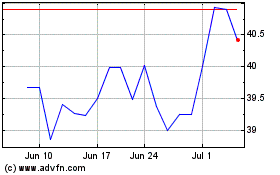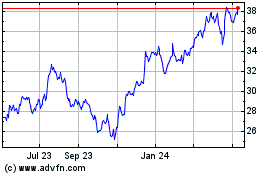By Lisa Beilfuss
Some Merrill Lynch brokers are bracing for a pay cut this summer
as the firm's parent, Bank of America Corp., rolls out a new
compensation program that punishes advisers who don't meet certain
sales targets.
The new plan is stirring some discord inside Merrill, in part
because it emphasizes cross-selling outside brokers' traditional
role. Some brokers are also complaining the plan is being applied
retroactively in what amounts to a pay clawback.
"It's going to be ugly," said one longtime Merrill broker who
has spent recent weeks grousing with colleagues about the
changes.
Bank of America unveiled the changes late last year in how its
17,000 Merrill financial advisers would be paid as part of an
effort to increase the unit's profit, regardless of stock-market
conditions. The plan, which is also a response to a tougher
competitive environment, is meant to juice brokers' assets, swell
bank deposits and funnel more clients into retail-bank products
such as mortgages and credit cards.
The program "is having the desired impact," said Andy Sieg, head
of Merrill Lynch Wealth Management. "Advisers are prioritizing
client acquisition" and "making referrals to the broader Bank of
America at higher levels than ever before."
That is potentially good news for the bank's shareholders, who
are already enjoying a bounce in the stock from a stronger economy
and higher interest rates. Clients with more of their assets and
liabilities spread across a big bank are potentially more lucrative
and may be less likely to leave if a broker retires or jumps to a
rival.
Merrill and its competitors have traditionally rewarded growth
instead of punishing the lack of it, analysts say. Introducing a
stick -- the first in recent years by one of the big firms --
reflects how traditional Wall Street brokerages are fighting off an
increasing number of cheaper, tech-enhanced options.
Investors have been flocking to automated platforms, discount
brokerages and independent advisers who aren't beholden to products
affiliated with a big bank.
At the same time, market-driven gains that have helped brokers
for nearly a decade have become less reliable this year amid
worries of rising bond yields and inflation.
Typically, brokers at Merrill and its rivals are paid a
percentage of the fees and commissions they generate. Advisers
generating $1 million annually in revenue, the average at Merrill,
pocket 42% of that for themselves, or $420,000, for example. The
traditional model of paying brokers can give them some latitude
over how they serve clients and boost business.
Under Merrill Lynch's new plan, however, pay could move up or
down based not just on revenue, but also based on asset and
liability growth, the number of new clients the broker brings in
and referrals to various parts of the bank.
If minimum sales targets aren't met, the broker generating $1
million in revenue could lose up to $10,000 from their June
paycheck because they would be collecting 2 percentage points less
of the revenue generated. The penalty then applies to monthly pay
going forward.
If brokers hit certain higher targets, they can get up to a 2
percentage point bump in pay, as long as they make two referrals to
the parent bank. Monthly pay for those brokers would increase
through December, when advisers' progress hitting targets is
re-evaluated.
Merrill Lynch didn't comment on the number of brokers it expects
to be affected by the pay change in July. Some employees estimated
it would at least be in the hundreds.
Merrill told brokers in a memo Wednesday that it would expand
the definition of new clients to include some who already have an
account with the firm's online discount brokerage platform. "Our
goal is to have every single one of you hit your growth grid
hurdle," the memo said.
Mr. Sieg said in an interview Tuesday that he expects that the
dollar impact of pay cuts will roughly be offset by the bonuses the
firm gives to higher-performing advisers. He added that executives
across the country will meet with brokers by June to make sure they
understand the new program.
Some financial advisers say the changes put too much pressure on
them to push products that customers may not want. "When they put
referrals in the comp plan, that codified it for us," said Emerson
Ham, an adviser who left Merrill Lynch in March after 26 years with
the firm. "There's a fine line between encouraging referrals and
forcing them."
Firms say clients appreciate the convenience of having
everything from retirement-savings accounts to a checking account
and a mortgage in one place.
Many longtime Merrill brokers, though, have bristled at the
strategy to more closely tie the business to the retail bank. They
say they have lucrative and hard-fought client relationships they
don't want to jeopardize by pushing incremental banking products
that they feel are beneath them or unnecessary.
"I understand why they and other banks do it," said Mr. Ham, the
recently departed Merrill broker, of Bank of America's efforts to
get Merrill's herd of brokers to drive business to other lines.
"But in the end we felt we need to be the judge of what's best for
a client."
Write to Lisa Beilfuss at lisa.beilfuss@wsj.com
(END) Dow Jones Newswires
May 24, 2018 07:57 ET (11:57 GMT)
Copyright (c) 2018 Dow Jones & Company, Inc.
Bank of America (NYSE:BAC)
Historical Stock Chart
From Mar 2024 to Apr 2024

Bank of America (NYSE:BAC)
Historical Stock Chart
From Apr 2023 to Apr 2024
